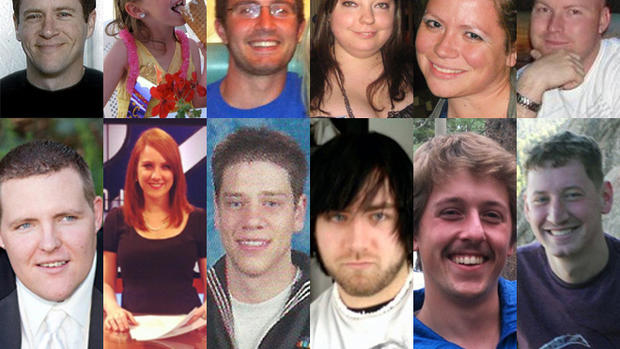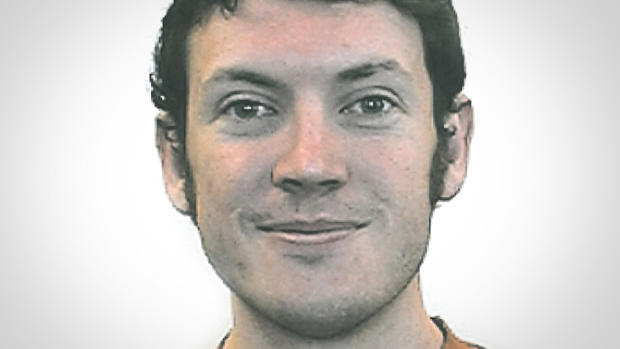Records show new details about missed chance to stop James Holmes
DENVER -- More than a month before James Holmes' rampage on a Colorado movie theater, the head of his neuroscience graduate program called a campus police officer with alarming information: Holmes had told his psychiatrist that he wanted to kill people to make up for his failure in science.
The call, never previously disclosed, came just after the psychiatrist expressed similar concerns to the same University of Colorado campus police officer. But newly released documents show the officer did little other than check to see whether Holmes had a criminal record and deactivate his campus access cards. And his psychiatrist declined to detain Holmes, who had revealed no specific targets or threats, because she thought it would only "inflame him."
The documents obtained by The Associated Press provide new details about the best chance authorities had to stop Holmes before the July 2012 theater massacre. They also show how hard it can be to predict who will turn violent, even when they've displayed warning signs, experts say.
"There's no reliable way we can identify those few who will pick up a gun and start shooting people from the vast number who might seem odd or unusual or even scary," said James Alan Fox, a Northeastern University criminologist who has studied and written about mass killings. "You can't predict it. Did they do everything they could have? That's another question."
A judge last week sentenced Holmes to life in prison without parole for murdering 12 people and trying to kill 70 more after jurors couldn't agree that he deserved the death penalty. The documents, released by the University of Colorado and prosecutors in response to open-records requests by the AP, provide the fullest look yet at how university officials handled concerns about Holmes, who dropped out of the prestigious program a month before the attack. A longstanding gag order lifted at the end of Holmes' trial had prohibited officials from releasing the documents or speaking publicly about the case.
A lawsuit filed by the widow of one of Holmes' victims accuses university officials and Holmes' psychiatrist, Dr. Lynne Fenton, of not doing enough to stop the shooting. With the trial over, the lawsuit can proceed. During the trial, Fenton testified that, without specific threats or targets, she lacked the evidence to have him placed on a 72-hour psychiatric hold.
The university said in a statement that its faculty and staff acted responsibly. Campus police officer Lynn Whitten, who was not named in the lawsuit, has since retired. Her attorney, Tom Rice, said she did all that she could with the limited information she had, none of which gave her reason to believe Holmes was an imminent danger.
Holmes started seeing Fenton in 2012 to help with his social anxiety. He soon confided that he was having thoughts about killing people.
His last visit was June 11, 2012. By then he had already amassed an arsenal of weapons and body armor and was meticulously planning his attack on a packed showing of a new Batman movie. But all Holmes told Fenton and another psychiatrist, Robert Feinstein, was that he had failed a key exam and was dropping out of the neuroscience program.
Holmes "left in a huff," Fenton told Whitten, whom she called the same day. She was concerned because Homes had told her "I want to kill as many people as possible," and she wondered if he was nearing a psychotic break, according to the documents.
Though he had "constant homicidal thoughts," Fenton told Whitten, he had never revealed specific targets or plans. But Whitten wrote in her notes that "Holmes indicated to Fenton that he liked thinking about it."
Fenton was alarmed enough to violate Holmes' health privacy rights and call his mother, Arlene. But Fenton did not tell Arlene Holmes about her son's homicidal obsession, instead mentioning that he'd dropped out of school.
The documents show that Fenton found Holmes' mother's reaction reassuring.
She left a voicemail for Whitten: "It's pretty good news on our guy James. It sounds like he's always been like this. I've talked to his mom, she and the dad are kind of putting some quiet support in place. They've got my number in case they need anything."
She concluded: "So, anyway, I think we've got everything in place for now, so if something else comes up I'll let you know."
Arlene Holmes testified during the trial that Fenton didn't return her calls seeking more information. Fenton chose not to detain Holmes because she felt he was "on the borderline" and didn't think it would help, she told Whitten, according to the documents.
About the same time, Fenton called University of Colorado professor Sukumar Vijayaraghavan, head of the neuroscience program, about Holmes, the documents say.
"James had told her (Fenton) he did not think he would make a mark on the world with science so he could blow up people and become famous," Vijayaraghavan told police, according to the documents. Vijayaraghavan said he then called Whitten, who told him "action would be taken immediately." She said she had suspended his student ID and "police are aware of the situation and are keeping an eye on the whole thing."
After the shooting, Whitten told Aurora police she "discussed Holmes" with her sergeant and checked with others on the status of his withdrawal from the university.
Fenton said she never heard from Holmes again. But Holmes didn't stop thinking about her. Hours before he left for the theater, he mailed her a journal where he had scrawled his detailed plans for the attack, plans he said he pointedly kept from her during their sessions.

